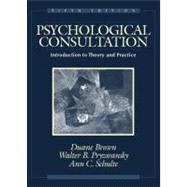
Psychological Consultation: Introduction to Theory and Practice
- ISBN13: 9780205322107
- ISBN10: 0205322107
- Additional ISBN(s): 9780205411795
- Edition: 5th
- Format: Hardcover
- Copyright: 2001-01-01
- Publisher: Allyn & Bacon
- View Upgraded Edition
-
Your order must be $35 or more to qualify for free economy shipping. Bulk sales, PO's, Marketplace items, eBooks and apparel do not qualify for this offer.








